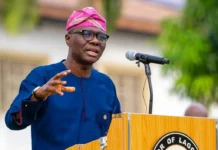 Lawyer Concerned Over Resources Spent On Public Prosecution
Lawyer Concerned Over Resources Spent On Public Prosecution
THE trial of former Group Managing Director of Access-Bank- acquired Intercontinental Bank Plc, Mr. Erastus Akingbola, was quashed by the prosecution counsel, and not the court presided over by Justice Charles Efanga Archibong, according to Chuks Nwachukwu, a legal practitioner.
Hinging his argument on the technicality of criminal law, Nwachukwu said the 26-count charge was terminated by the prosecution because the senior counsel did not show readiness to prove any case against the former president of the Chartered Institute of Bankers of Nigeria (CIBN).
Nwachukwu also said the erstwhile banker had never faced trial, as, according to the law, trial is deemed to have commenced after charges are read to an accused person and given an opportunity to take a plea in a criminal case.
As expected, the freedom handed down to Akingbola by a Lagos High Court faced its first test few days after. The prosecutor (the Federal Government) filed an appeal against the ruling it branded as “unreasonable.” It also accused the judge of “bias and recklessness.”
But Nwachukwu said there was no technical ground to prove bias, as the word is used, in strict sense, to describe a situation where a judge is swayed by a personal interest in a matter brought before him.
“A judge is not biased because he is not happy with a party to a case but he is when he has a personal interest that influences his decision,” he noted.
The legal expert said the prosecutors were merely asking the judge to quash the case when they appealed for a stay of proceeding, as it is illegal to curtail the fundamental human rights of an accused person against whom the prosecutor is not ready to press charges.
Hence, he said, the prosecutors of Akingbola, and not the court, terminated the trial, “as their lack of seriousness built up to a point where the judge had no choice but to strike out the case.”
He continued: “Normally, it is the defence counsel that delays a criminal trail, but the reverse was the case in Akingbola’s matter. The accused person was even asking for a speedy trial while the prosecutors were not interested.”
“And no judge will continue to tolerate such situation. The judge and the defence team said charges should be read, after they were amended three times, so that the accused person would take a plea; but the prosecutors were not ready.”
“ As it is, Akingbola never faced trial because charges were not read to him. Meanwhile, the prosecutor went about telling the whole world that he was being trialed.”
On April 2 when the ruling was delivered, Akingbola was said to have entered the dock in readiness to take a plea after amended charges might have been read to him.
Nwachukwu said he was shocked to hear from a member of the prosecution team (a SAN) that “he thought the business of the day was just to act on the application for amendment of charges and that he needed to consult with his colleagues before the charges were read.”
This and other previous similar actions were said to have compelled the judge to pass the order.
Nwachukwu also introduced another dimension to the prosecution saga when he called for a closer assessment of the country’s public prosecution system. He argued that only an attorney general is legally empowered to handle public prosecution; and that public fund is not committed in a common law jurisdiction where a private lawyer is appointed to do that on behalf of the state.
Already, there is a growing concern that the country might have wasted huge resources on ongoing as well as previous public prosecutions, which many said turned to be ruse. There are speculations in legal circle that the six SANs that prosecuted the erstwhile banker earned about N100m each for their service. It would be recalled that Archibong, in his ruling, described the learned fellows as “a drain on the public purse.”
While source of the expenses remains sketchy, Nwachukwu raised alarm that it they and others relating to the removed bank chiefs might have been funded by the Central Bank of Nigeria (CBN). And if that is true, he said, the situation raises question on the genuineness of the bank’s commitment to the reform in the industry.
“The question is — is the CBN statutorily empowered to fund public prosecution? Should the CBN fund private lawyer to do public prosecution when there is AGF that is legally empowered to do that? What is its interest? You have accused people of crime while the state has a law on how prosecution is done. If you show over-zealousness, there is a question on the genuineness of your action,” noted the lawyer.



